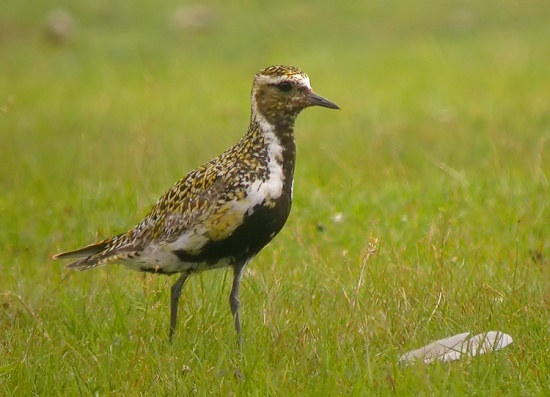(redirect) |
(replacing redirect) |
||
| Line 1: | Line 1: | ||
| − | + | ;Pluvialis apricaria | |
| + | [[Image:Eurasian_or_European_Golden_Plover.jpg|thumb|550px|right|Photo by Digiscoper321 <br>Photographed: West Sweden]] | ||
| + | | ||
| + | ==Identification== | ||
| + | The Eurasian Golden Plover, Pluvialis apricaria, is a largish plover.This species is similar to two other golden plovers. American Golden Plover, Pluvialis dominiica, and Pacific Golden Plover, Pluvialis fulva, are both smaller, slimmer and relatively longer-legged than Eurasian Golden Plover, and both have grey rather than white axillary feathers (only properly visible in flight | ||
| + | |||
| + | Breeding adults are spotted gold and black on the crown, back and wings. Their face and neck are black with a white border; they have a black breast and a dark rump. The legs are black. In winter, the black is lost and the plover then has a yellowish face and breast and white underparts. | ||
| + | ==Distribution== | ||
| + | They are migratory and winter in southern Europe and north Africa. Around 500,000 birds winter in Ireland and Great Britain. Although generally common, its range has contracted somewhat in the past due to habitat destruction. For example, in the 19th century it disappeared as a breeding bird in Poland and only occurs there as a migrant nowadays; its breding population in Central Europe apparently was a relict of the last ice age (Tomek & Bocheński 2005). | ||
| + | |||
| + | ==Taxonomy== | ||
| + | Kingdom: Animalia | ||
| + | Phylum: Chordata | ||
| + | Class: Aves | ||
| + | Order: Charadriiformes | ||
| + | Family: Charadriidae | ||
| + | Genus: Pluvialis | ||
| + | Species: P. apricaria | ||
| + | ==Habitat== | ||
| + | Their breeding habitat is moorland and tundra in northernmost parts of Europe and western Asia. They nest on the ground in a dry open area. | ||
| + | ==Behaviour== | ||
| + | These birds forage for food on tundra, fields, beaches and tidal flats, usually by sight, although they will also feed by moonlight. They eat insects and crustaceans, also berries | ||
| + | |||
| + | ==Bird Song== | ||
| + | <flashmp3>Pluvialis apricaria (song).mp3</flashmp3><br /> | ||
| + | ''[[Media:Pluvialis apricaria (song).mp3|Listen in an external program]]'' | ||
| + | ==External Links== | ||
| + | {{GSearch|Pluvialis+apricaria}} | ||
| + | *[http://www.orientalbirdimages.org/birdimages.php?action=birdspecies&Bird_ID=1029&Bird_Image_ID=3680&Bird_Family_ID=109 View more images of this species on Orientalbirdimages] | ||
| + | [[Category:Birds]] | ||
Revision as of 00:58, 9 September 2007
- Pluvialis apricaria
Identification
The Eurasian Golden Plover, Pluvialis apricaria, is a largish plover.This species is similar to two other golden plovers. American Golden Plover, Pluvialis dominiica, and Pacific Golden Plover, Pluvialis fulva, are both smaller, slimmer and relatively longer-legged than Eurasian Golden Plover, and both have grey rather than white axillary feathers (only properly visible in flight
Breeding adults are spotted gold and black on the crown, back and wings. Their face and neck are black with a white border; they have a black breast and a dark rump. The legs are black. In winter, the black is lost and the plover then has a yellowish face and breast and white underparts.
Distribution
They are migratory and winter in southern Europe and north Africa. Around 500,000 birds winter in Ireland and Great Britain. Although generally common, its range has contracted somewhat in the past due to habitat destruction. For example, in the 19th century it disappeared as a breeding bird in Poland and only occurs there as a migrant nowadays; its breding population in Central Europe apparently was a relict of the last ice age (Tomek & Bocheński 2005).
Taxonomy
Kingdom: Animalia Phylum: Chordata Class: Aves Order: Charadriiformes Family: Charadriidae Genus: Pluvialis Species: P. apricaria
Habitat
Their breeding habitat is moorland and tundra in northernmost parts of Europe and western Asia. They nest on the ground in a dry open area.
Behaviour
These birds forage for food on tundra, fields, beaches and tidal flats, usually by sight, although they will also feed by moonlight. They eat insects and crustaceans, also berries
Bird Song
<flashmp3>Pluvialis apricaria (song).mp3</flashmp3>
Listen in an external program




